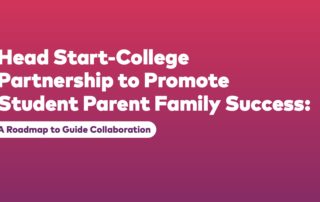Education and Career Advancement
Education is a cornerstone of economic security, and we are committed to breaking down barriers to advancement. We research student parents, career training opportunities through apprenticeships and workforce development, and other policies that reduce student debt and make college more accessible for women, particularly women of color.

Busy with Purpose: Lessons for Education and Policy Leaders from Returning Student Parents
Postsecondary attainment is widely recognized as key to accessing living-wage careers—in addition to fulfilling workforce demands and elevating the United States’ standing on the world stage. While much of the work to increase attainment rates has recognized the role of reengaging adults who have some college credit, but no degree or certificate, less attention has been paid to the salience of parenthood in adults’ postsecondary experiences.
Centering the Student Voice: Community Colleges and Sexual and Reproductive Health Access in Texas and Mississippi
Community college students’ lives outside of the classroom—including their sexual and reproductive health— can directly impact their ability to succeed in school, yet most community colleges do not provide sexual and reproductive health services (Bernstein and Reichlin Cruse 2020). Growing efforts to implement holistic approaches to student success also often ignore the role that sexual and reproductive health outcomes can play students’ academic careers.
Understanding the Student Parent Experience: The Need for Improved Data Collection on Parent Status in Higher Education
Data on students’ parent status would help campuses, higher education systems, and policymakers assess needs, target supports and services, understand student outcomes, and measure what works to promote student parent enrollment, persistence, and completion.
Head Start College Partnership to Promote Student Parent Family Success: A Roadmap for Collaboration
Collaboration between colleges and Head Start programs holds promise for promoting the educational and economic well-being of college students with young children.








